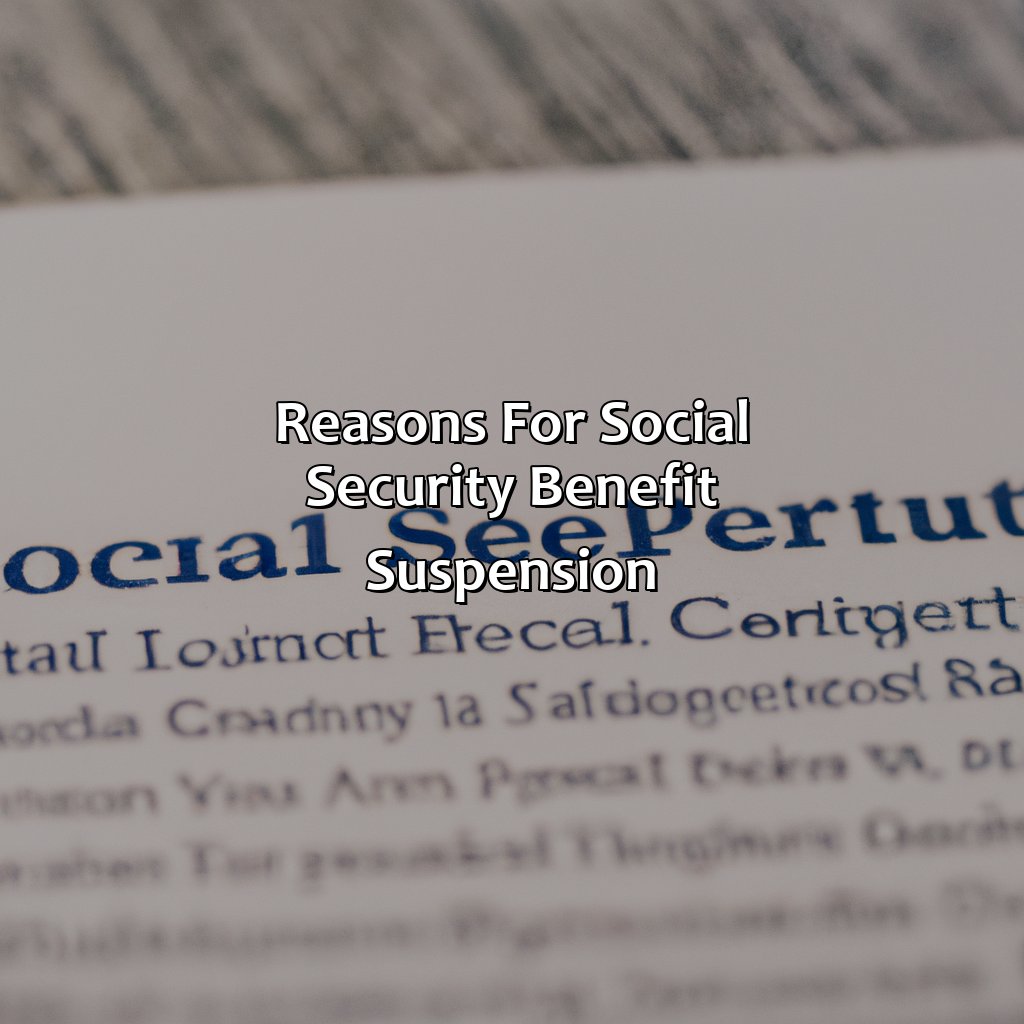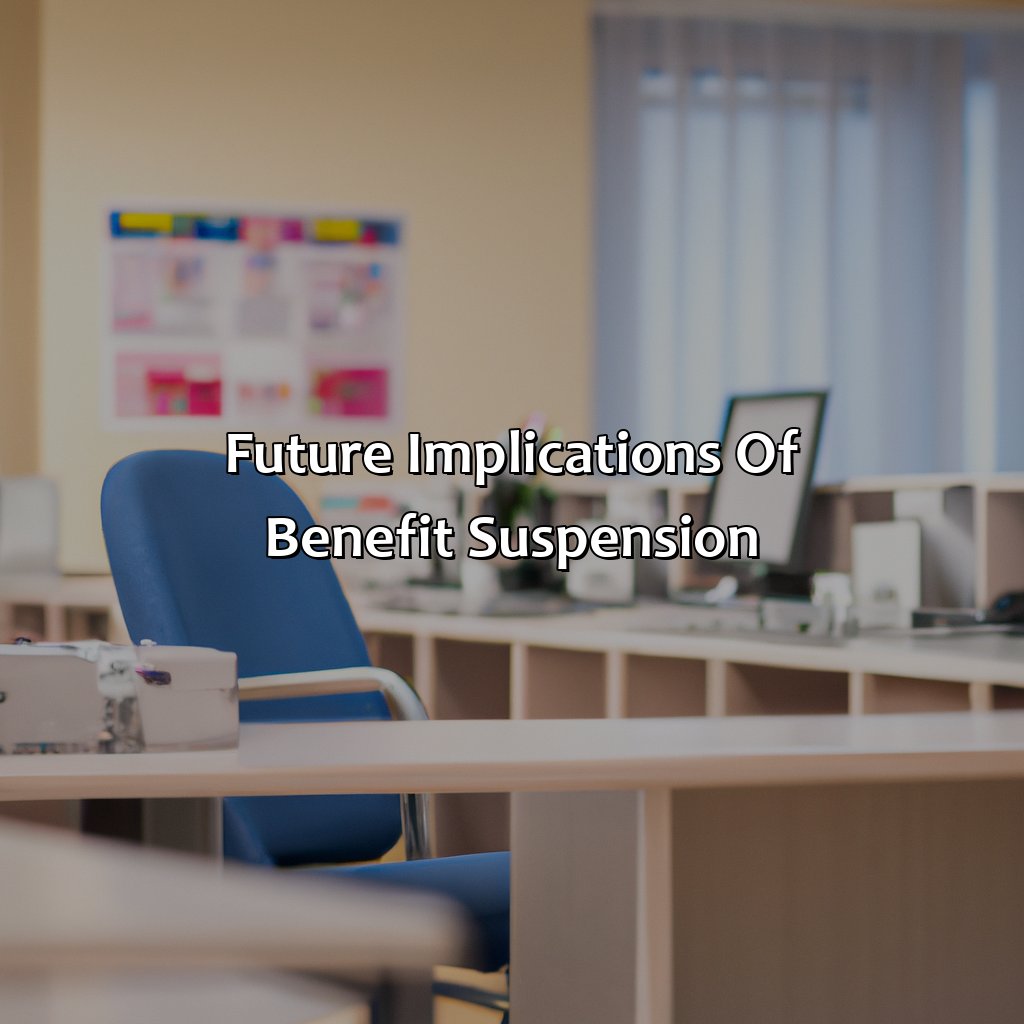Why Would Social Security Benefits Be Suspended?
Key Takeaway:
- Social Security benefits may be suspended due to non-compliance with eligibility criteria, working and earning limitations, criminal conviction and incarceration, failure to report changes in circumstances, inaccurate or incomplete information, and medical recovery and improvement.
- If your Social Security benefits are suspended, you have the right to appeal the decision. This can be done by filing an appeal, appealing the decision through an administrative law judge, requesting an on-the-record decision, or reapplying for benefits.
- Suspension of Social Security benefits can have a significant impact on your overall income and financial stability. It is important to regularly communicate with the Social Security Administration, understand eligibility criteria and benefit limitations, and seek professional advice and consultation if needed.
Are you worried about social security benefits being taken away from you? This blog will explain why the government could suspend your benefits and how to prevent it from happening. You will also learn the consequences of suspension so you can take the right steps to protect your rights.
Reasons for Social Security Benefit Suspension
Why social security benefits might be suspended? To learn, take a look at the causes. Sub-sections to tackle it include:
- Not meeting eligibility criteria
- Working/earning boundaries
- Criminal conviction and imprisonment
- No report of changes
- Incorrect or lacking data
- Medical recovery or improvement

Image credits: retiregenz.com by Yuval Arnold
Non-compliance with Eligibility Criteria
Eligibility Breach and Suspended Social Security Benefits
When individuals fail to comply with the eligibility criteria of Social Security benefits, their benefits are subject to suspension. Non-fulfillment of requirements such as sufficient work credits or age qualification can lead to halted payments.
In such a scenario, the Social Security Administration will send a notification detailing the reason for suspension and how it can be resolved. If the issue is not addressed within a given time limit, benefit termination may occur.
It’s crucial to track all necessary information, such as income reports, health status, and other evidence that verifies your qualification for continued benefits. Merely relying on mandated schedules for renewal paperwork isn’t always recommended.
Not long ago, a Social Security fraud scheme was discovered involving identity theft and evasion – those affected had their benefits suspended because their names had been exploited by fraudsters. Therefore staying cautious of suspicious activity and updating personal records regularly are also essential factors for avoiding unexpected suspension hassle.
Why work hard when you can just hit the earning limit and enjoy an unwarranted social security vacation?
Working and Earning Limitations
The Social Security Administration imposes limitations on the earnings of social security benefit recipients. For most beneficiaries, earning more than a specific limit may lead to a reduction of benefits or even a suspension. This is because the government wants to reward those who have retired and are no longer earning an income rather than provide additional payments for people who are still working.
In short, if an individual earns more than the income limit allowed by the Social Security Administration while receiving their benefits, there will be consequences. These limits vary depending on the age in which they apply for their benefits. Also, typically if you reach full retirement age during 2021, the earning limit is $50,520 annually before your monthly benefit will be reduced or temporarily suspended.
It’s important to note that not all forms of income are considered while calculating these limitations. For instance, inherited money and most gifts would usually not count towards an individual’s total earned income. Also, those who have reached retirement age without claiming Social Security benefits but continue to work can earn any amount without impacting their eligible monthly benefits.
Take Sarah for example; she was working full-time and claimed her social security at the age of 62. Soon after surpassing the income limit by working overtime during winter months when things were busy she was reducing her monthly income due to penalties imposed by SSA as she did not comply with its rules regarding limits on working as a retiree.
Why worry about retirement when you can have a free extended stay in a government-run hotel?
Criminal Conviction and Incarceration
Being convicted of a crime or being incarcerated can lead to Social Security benefit suspension. Such cases fall under the category of ‘Legal Involvement’ and include various scenarios where an individual is serving time in prison, violating probation, committing fraud, etc.
When a person is convicted of a crime or violates their parole/probation, their benefits may be suspended until they are released from incarceration or comply with legal conditions. Additionally, if an individual commits fraud while receiving disability benefits, their payments may be stopped.
It’s crucial to note that not all convictions result in benefit suspension. For instance, individuals with outstanding warrants or who have been charged with a crime but haven’t yet been convicted may continue to receive their social security benefits.
One individual’s story highlights how legal involvement can impact social security benefits. After being incarcerated for two years, Sarah’s disability payments were suspended since she no longer met the eligibility requirements. Upon her release, Sarah worked with a social security representative to restore her benefits and ensure ongoing support.
I may forget to report a change in my relationship status to my parents, but the government won’t let me forget to report it to them for my social security benefits.
Failure to Report Changes in Circumstances
Failing to report changes in circumstances can result in suspension of social security benefits. Neglecting to inform the authorities about any significant life changes may lead to overpayment and require payback. Therefore, claimants should report any alterations in their work status, marriage, or address within ten days.
Non-disclosure of a change in marital status, returning to work sooner than anticipated or moving residences without notifying the Social Security Administration can result in discontinued benefits. The administration might not need to pay back the funds but could suspend payments temporarily until they ascertain the correct payout amount. In some cases, individuals may have to return funds received erroneously due to delayed reporting.
Individuals must also report any income that they earn from sources other than their social security benefit as failing to do so means they are receiving extra money for which they were not eligible. The failure can lead to overpayments and even criminal prosecution if deemed intentional.
It is similar to a true story where a woman fails to notify the Social Security Administration about her foreign residency, but she continued receiving benefits illegally. Upon investigation by officials, it was revealed that the woman had moved overseas years earlier but never bothered updating her new location with authorities. As a consequence, she was ordered by court officials to refund all the excess money she got from them over several years.
Your social security benefits are like a house of cards, one wrong move and the whole thing comes crashing down – especially if you provided inaccurate or incomplete information.
Inaccurate or Incomplete Information
When the Social Security Administration receives inaccurate or incomplete information, it may result in the suspension of benefits. The agency relies heavily on accurate and timely information to ensure beneficiaries receive the correct amount of benefits. Failure to provide complete and accurate information can lead to a reduction or termination of benefits. Additionally, providing false or misleading information is considered fraud and can result in legal action being taken against the beneficiary.
It’s important to note that inaccurate or incomplete information can come from many sources, including employers, medical providers, and even the beneficiaries themselves. It’s crucial for individuals receiving Social Security benefits to keep their personal information up-to-date and notify the agency if any changes occur.
Failure to adhere to these guidelines may result in unpaid benefits or even repayment of previously received payments. This can cause financial difficulties for those who rely on Social Security benefits as their primary source of income.
Therefore, it’s essential for beneficiaries to ensure that they provide accurate and timely information to the Social Security Administration. Doing so will not only prevent benefit suspension but also ensure continued support from the program.
When it comes to medical recovery and improvement, Social Security benefits seem a lot like a yo-yo – up one day, suspended the next.
Medical Recovery and Improvement
Aid for Health Recovery and Enhancement
If beneficiaries are able to return to work due to improved health, Social Security benefits can be suspended. The agency has programs like Ticket-to-Work that incentivizes beneficiaries to transition off of benefits through career training, job placement assistance or vocational rehabilitation services.
Furthermore, even if one’s condition worsens, the agency will evaluate their eligibility based on whether they can perform substantial gainful activity (SGA) despite the condition. If a beneficiary doesn’t meet their medical improvement standard (MIRS), then benefits will continue. However, if medical reviews determine improvements in functional capacity and likelihood of significant recovery, Social Security Disability (SSD) or Supplemental Security Income (SSI) payments may stop.
In addition, a beneficiary reported successfully recovering from their disability after receiving SSDI for several years. They were informed they could attempt “trial work”, which allows disabled persons to attempt working full-time without sacrificing their benefits for up to nine months. After completing a successful trial work period, these individuals undergo a 36-month extended evaluation period during which if they still earn above SGA limits ($1,310/month), their SSDI checks terminate in the following month.
Good luck appealing your benefits suspension, it’s like trying to ask a vending machine for a refund.
Appeal and Reinstatement of Benefits
Want to get your social security benefits back after suspension? You need to know what your options are. Check out the following sub-sections to understand the next steps:
- Filing an Appeal
- Appealing Decision through Administrative Law Judge
- Requesting an On-the-Record Decision
- Reapplying for Benefits
These sub-sections will help you understand the next steps.

Image credits: retiregenz.com by Joel Duncun
Filing an Appeal
If you believe your social security benefits have been suspended unfairly, there is hope. Initiating an appeal is a complex process, but it can lead to reinstated benefits and peace of mind. Your first step should be to request an appeal within 60 days of receiving your suspension notice.
Once your request has been processed, an administrative law judge will hear your case and make a decision based on the evidence presented. It’s important to gather any relevant documentation or witness statements that may support your claim, as well as prepare yourself for questioning from the judge or government representative.
If your appeal is successful, you may receive back pay for any benefits missed during the suspension period. In some cases, a medical condition or change in circumstances may require ongoing appeals to maintain benefits.
A woman with chronic health issues was receiving social security disability benefits when they suddenly stopped coming. She immediately began her appeal process and enlisted the help of legal counsel. After months of gathering evidence and presenting her case, her benefits were eventually reinstated, allowing her to continue receiving vital financial assistance.
If at first you don’t succeed in appealing your benefit suspension, try, try again with the help of an administrative law judge.
Appealing Decision through Administrative Law Judge
When one does not agree with the Social Security Administration’s (SSA) decision, they may request an appeal hearing before an Administrative Law Judge (ALJ). The ALJ conducts a formal proceeding and makes a decision based on the evidence presented. The appellant has the right to present witnesses, examine evidence, and provide testimony to support their case.
It is important to note that appealing is not always successful and may take some time before a decision is made. However, if the appellant receives a favorable outcome, benefits can be reinstated retroactively.
When appealing through an ALJ, it is crucial to have a strong case supported by evidence. Some factors considered include medical records, work history, and age. The ALJ will consider all aspects of the case before making a ruling.
Pro Tip: Hiring an attorney who specializes in social security law can significantly increase chances of success in appealing through an ALJ. They can help present your case effectively and maximize chances of having benefits reinstated.
Making a request for an on-the-record decision is like asking a turtle to run a marathon- it’s slow and takes patience, but it’s worth it in the end.
Requesting an On-the-Record Decision
When requesting a decision based on the record, it means that you want the Social Security Administration (SSA) to approve your case using existing evidence and documentation. This is done instead of waiting for a hearing with an administrative judge. It can often be a faster way to get benefits that have been suspended or denied.
To request an on-the-record decision, you must provide any new medical records or other evidence that supports your claim. You should make sure to include all relevant information, including any updates or changes in your medical condition. The SSA will review this information and determine if they can make a decision based on the record alone.
It’s important to note that not all cases are eligible for an on-the-record decision. If there are issues with the evidence or more information is necessary, then a hearing may still be required. In these cases, it’s beneficial to work with an experienced Social Security attorney who can help guide you through the process and ensure that you’re presenting the strongest case possible.
Don’t miss out on potential benefits because of delayed hearings or lack of adequate evidence. Consider requesting an on-the-record decision and work with professionals to present the best case possible.
Like a bad penny, sometimes you’ve gotta keep reapplying for social security benefits until they finally give in and let you have them.
Reapplying for Benefits
When Benefits Get Suspended – What to Do Next?
If your social security benefits have been suspended or denied, you may need to reapply for them. This can happen due to many reasons such as not meeting the eligibility criteria anymore or failing to report certain changes about your earnings or life circumstances.
To reapply for benefits, you will need to provide updated and accurate information about yourself and meet all the necessary requirements of the program. You can do this online or by visiting your local SSA office.
It’s important to keep in mind that there are strict deadlines and rules regarding appeals and reinstatement of benefits. Failure to act fast can lead to loss of important financial support and opportunities.
Don’t let fear or confusion stop you from seeking help when you need it most. Talk to a social security representative today and learn more about how you can get back on track with your benefits. Remember, time is of the essence!
Why worry about retirement when your social security benefits are already suspended?
Future Implications of Benefit Suspension
Let’s break down the consequences of suspending social security benefits. First, we must consider how this will affect overall income and financial stability. Second, it is essential to stay in contact with the Social Security Administration. Third, make sure you understand eligibility criteria and benefit limits. Lastly, it is wise to seek professional advice.

Image credits: retiregenz.com by Harry Jones
Impact on overall Income and Financial Stability
The possibility of social security benefit suspension can significantly impact an individual’s overall financial stability and income. Social security benefits serve as a primary source of income for disabled individuals or those who have retired. The sudden halt in these benefits due to unexpected circumstances can lead to significant financial stress and instability.
The implications of benefit suspension are far-reaching, particularly for those who rely solely on social security as their primary income source. For instance, having no regular financial support from the government could severely limit an individual’s ability to meet basic needs like paying rent, utility bills, or purchasing essentials like food and medication.
Moreover, loss of social security benefits can also impact long-term savings and retirement plans. Depending on how long the benefit suspension lasts, individuals might be unable to contribute towards saving goals or invest in plans like 401k, thus hindering future financial stability during post-retirement years.
It is crucial to prepare for unforeseen events that might lead to social security benefit suspension as they can adversely affect overall financial well-being.
According to CNBC’s report, more than 10 million people receive disability payments through Social Security Disability Insurance (SSDI) programs in the United States alone.
Talking to the Social Security Administration regularly is like going to the dentist – it may not be enjoyable, but it’s necessary for your long-term well-being.
Importance of Regular Communication with Social Security Administration
Regular Communication with Social Security Administration is vital for uninterrupted benefit payments. Keeping in touch enables you to keep track of any changes that may affect your benefits. It is essential to ensure that all relevant account details are updated, and eligibility requirements are continually met.
Failure to maintain consistent communication with the Social Security Administration can lead to significant issues, including benefit suspension or reduced payments. To avoid these problems, it’s necessary to have a clear understanding of the reporting requirements and address any issues promptly. This will help ensure timely updates and uninterrupted benefit payment delivery.
Moreover, maintaining good communication ensures you stay up-to-date on funding allocation variations that affect social security programs and may ultimately impact your benefits. Also, keeping ongoing communication helps inform you of policy changes and how they may impact your claims.
Pro Tip: Make use of online services offered by Social Security Administrations such as regular update emails and text message notifications about profile changes. This service helps improve communication channels between beneficiaries and administrations, improving oversight efficiency ensuring faster responses to requests for documentation and other administrative tasks relating to their benefits accounts.
Why bother working when you can just try to qualify for benefits and hit the benefit limitation jackpot?
Understanding Eligibility Criteria and Benefit Limitations
Eligibility Criteria and Limitations of Social Security Benefits
Social Security benefits serve as a safety net for vulnerable populations in society. Eligibility criteria for receiving such benefits include being disabled, elderly, or dependents of deceased wage earners. Additionally, there are limitations on the amount of income an individual can earn while still receiving benefits. These limits exist to ensure that only those who genuinely need support receive it.
It is important to understand that not everyone who applies for Social Security benefits will be eligible for them. Applicants must meet specific criteria and provide proof of their eligibility to receive assistance. Furthermore, benefit limitations may change over time due to factors such as inflation or government policy changes.
In recent years, there have been concerns about the future implications of benefit suspension for those living off Social Security benefits alone. It is essential to continue monitoring policies surrounding Social Security benefits and advocating for fair distribution to ensure the well-being of all eligible individuals.
Seeking Professional Advice and Consultation.
Professional Advice and Consultancy for Benefit Suspension
It is imperative to seek expert advice and counseling in case of benefit suspension. Qualified financial advisors can help you navigate through complex legalities and procedures, prepare and file your claims, represent you before the Social Security Administration (SSA), and protect your rights to receive benefits. Proper guidance can also ensure compliance with relevant laws, regulations, and deadlines, maximize your eligibility, optimize your payment amounts, minimize errors or discrepancies, and expedite resolution of disputes or appeals.
Furthermore, professional consultants can offer personalized solutions tailored to your specific circumstances such as medical conditions, employment history, marital status, income sources, age group, family members’ benefits, taxes or penalties. They can explain the implications of various scenarios like returning to work, getting remarried or widowed while receiving benefits or applying for other governmental assistance programs. They may also provide training or education on financial planning or budgeting skills.
In addition to these services and solutions, consulting agencies may conduct periodic reviews of your benefit status based on changes in laws or policies that could affect your payments. They could proactively notify you about any recommended actions that you need to take promptly to avoid losing entitlements without notice.
So do not put yourself at risk by facing benefit suspension alone. Leverage professional expertise to safeguard Your financial stability now and in the future!
Five Well-Known Facts About Why Social Security Benefits May Be Suspended:
- ✅ If you are earning too much income while receiving Social Security benefits, your benefits may be suspended or reduced. (Source: Social Security Administration)
- ✅ Failure to report changes in your circumstances, such as moving outside of the United States, can result in suspension of your Social Security benefits. (Source: AARP)
- ✅ If you are found to be committing fraud or misrepresenting information related to your benefits, your benefits may be suspended. (Source: Social Security Administration)
- ✅ If you are incarcerated for a crime, your Social Security benefits may be suspended while you are in jail or prison. (Source: Social Security Administration)
- ✅ If you receive certain other government benefits, such as workers’ compensation or temporary disability, your Social Security benefits may be reduced or suspended. (Source: Social Security Administration)
FAQs about Why Would Social Security Benefits Be Suspended?
Why would social security benefits be suspended?
There are several reasons why your social security benefits may be suspended:
- If you earn more than the allowable limit while receiving Social Security benefits, your benefits may be suspended.
- If you receive disability benefits, but your medical condition has improved to the point where you are no longer considered disabled, your benefits may be suspended.
- If you are convicted of a crime and are incarcerated for more than 30 days, your benefits may be suspended.
- If you fail to update your personal information, such as a change of address, your benefits may be suspended.
- If you are suspected of fraud, your benefits may be suspended during the investigation.
- If you owe money to the Social Security Administration, your benefits may be suspended to repay the debt.


